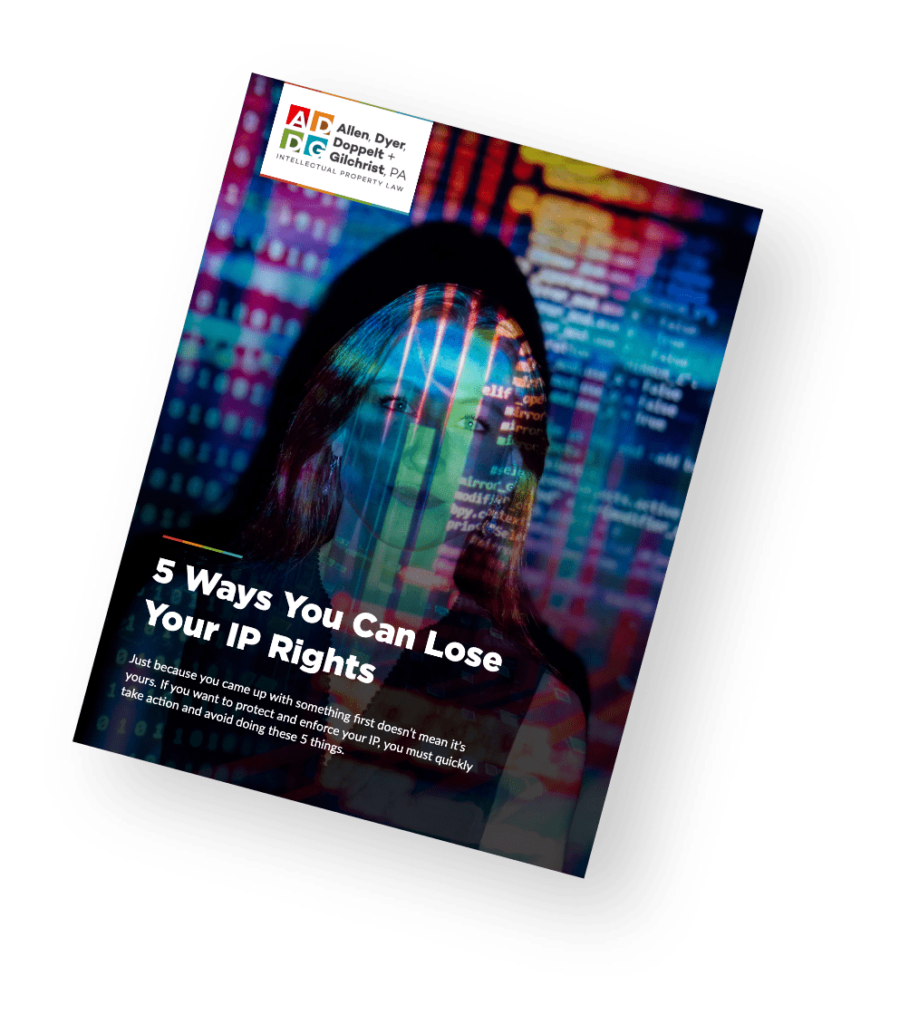
Inventors, like yourself, work tirelessly fine tuning the details of their work, and their creative minds continue to move our society forward through innovative technology. Unfortunately, patent issues can put a dramatic hold on your business’ progress. Therefore, it’s vital that you understand U.S. Patent Law and its role in the early stage of your startup.
Types of Patents
A patent is a type of intellectual property that grants the exclusive right to an individual for an invention, such as a product or process that provides a novel solution or way of doing something. In many cases, a patent is one part of a larger intellectual property portfolio that protects your products and services. The United States Patent and Trademark Office (USPTO) currently categorizes patentable inventions into three distinct categories.
1. Utility Patent
A utility patent protects useful and novel products, processes, or machines. A utility patent prohibits others from making, using, or selling the protected invention without the authorization of the patent holder. While utility patent applications are complicated legal documents to prepare and can take a relatively long time to get through the USPTO, the term of a utility patent extends 20 years from its earliest filing date, and gives the owner the ability to prohibit others from making, using or selling the patented technology. As such, utility patents can be tremendously valuable and provide significant commercial advantages to a business.
2. Design Patent
In some instances, your startup might require a design patent to protect the ornamental design of your product. To qualify for a design patent, you must be seeking protection for a new and original design, and it must apply solely to the ornamental appearance of the article. It may not cover any structural or utilitarian (functional) features for the product or prior art. However, it is possible that the same invention may have both ornamental and functional features that are separately patentable. That is, multiple patent types may be leveraged in such cases to create comprehensive coverage for one specific product.
3. Plant Patent
Patents apply to more than inanimate objects. Inventors may also obtain a particular patent to protect the invention or discovery of plants. However, plant patents don’t apply to plants discovered in nature. They must have been developed in a cultivated area, and they must be unique for reasons other than growing conditions or soil fertility.
That’s not all.
If you wish to patent a plant, it must be:
- Natural, Bred, or Somatic
- Sexually Reproducible
- Able to Reproduce Genetically Identical Offspring
- Reproducible Through Root Cutting, Bulbs, Division, or Grafting and Budding
The Benefits of Filing a Patent for a Startup
The patent laws and filing process are complicated, and this can cause startups to shy away from patenting their products. However, you shouldn’t delay your plans to file. Instead, you should work with a registered patent attorney to file the application as soon as possible. Your patent could prove to be the difference between a successful launch and a struggle to survive a competitive marketplace. The following are the specific benefits you stand to gain from a patented product, process, design, or plant:
- Secure Investors: Most startups rely heavily on investors to get up off the ground. Unfortunately, you cannot secure investment without disclosing the details of your invention. Filing for patent protection before such disclosures provides a clear record of the ownership of the technology. Moreover, public disclosure of your invention without filing for patent protection can forfeit your right to patent, so it’s crucial that you secure a patent pending status as soon as possible to avoid risking loss of patent rights, as investors will likely consider issued patents or pending patent applications a key piece of collateral when considering funding options.
- Protection from Competitors: Because an issued patent gives its owner the ability to prohibit others from making, using, or selling the patented invention, this can be a significant deterrent to competitors looking to “hone in” on the market. Even before a patent issues, while your application is pending, you are entitled to advertise your product as “patent pending” to put competitors on notice that you are in the process of securing patent rights to your invention, again serving as an effective deterrent to copycats.
- Create Income: Like other property, a patent can be licensed or sold to generate revenue for its owner. Patents may be licensed irrespective of whether the owner is a manufacturer or not, and they may be licensed in exclusive or non-exclusive arrangements to one or more parties. Depending on the technology, a given patent may have applicability (and therefore licensing value) to parties in different industry segments.
Need to File a Patent Application for a Startup?
Time is of the essence when filing an application for your patent, even more so when you’re launching a startup where it is often necessary to disclose your inventions to investors, technical consultants, and the like. Therefore, you should act fast and leave your patent filing to a team of patent attorneys that has the technical and legal experience to make sure your invention is well protected.
Fortunately, you don’t have to go far to find local experts for the job. If your startup is ready to begin filing for a patent, come to Allen, Dyer, Doppelt, + Gilchrist, P.A. Our intellectual property law firm proudly serves businesses in the Orlando, Jacksonville, Winder Springs, and Miami areas, as well as all of Florida and throughout the U.S. Contact us today to learn more about how we can help you obtain patents for your inventions.
About the Authors
John F. Woodson, II is a Registered Florida Patent Attorney based in the Orlando-area. His IP practice areas include patent prosecution, patent infringement studies and client counseling.

David S. Carus is a shareholder and Registered Florida Patent Attorney. He primarily practices in the area of patent prosecution.

Share This



